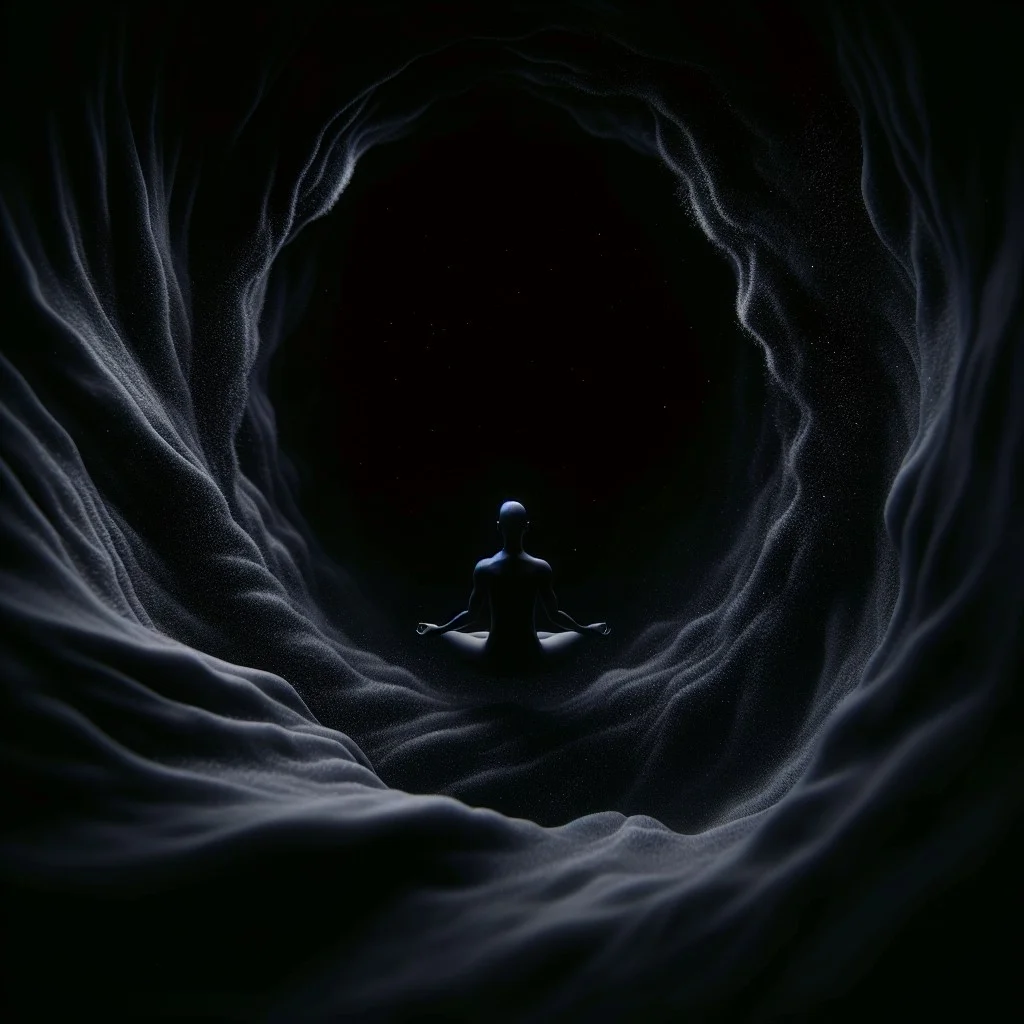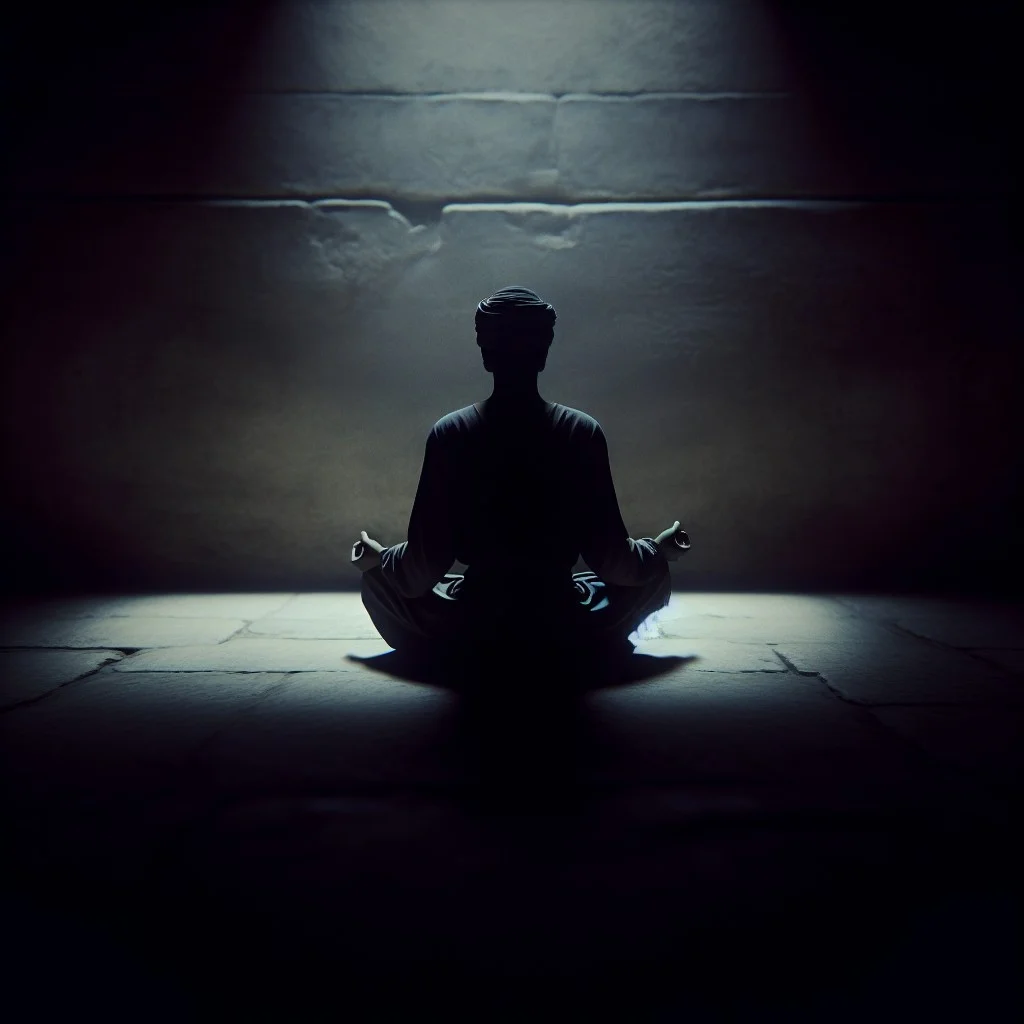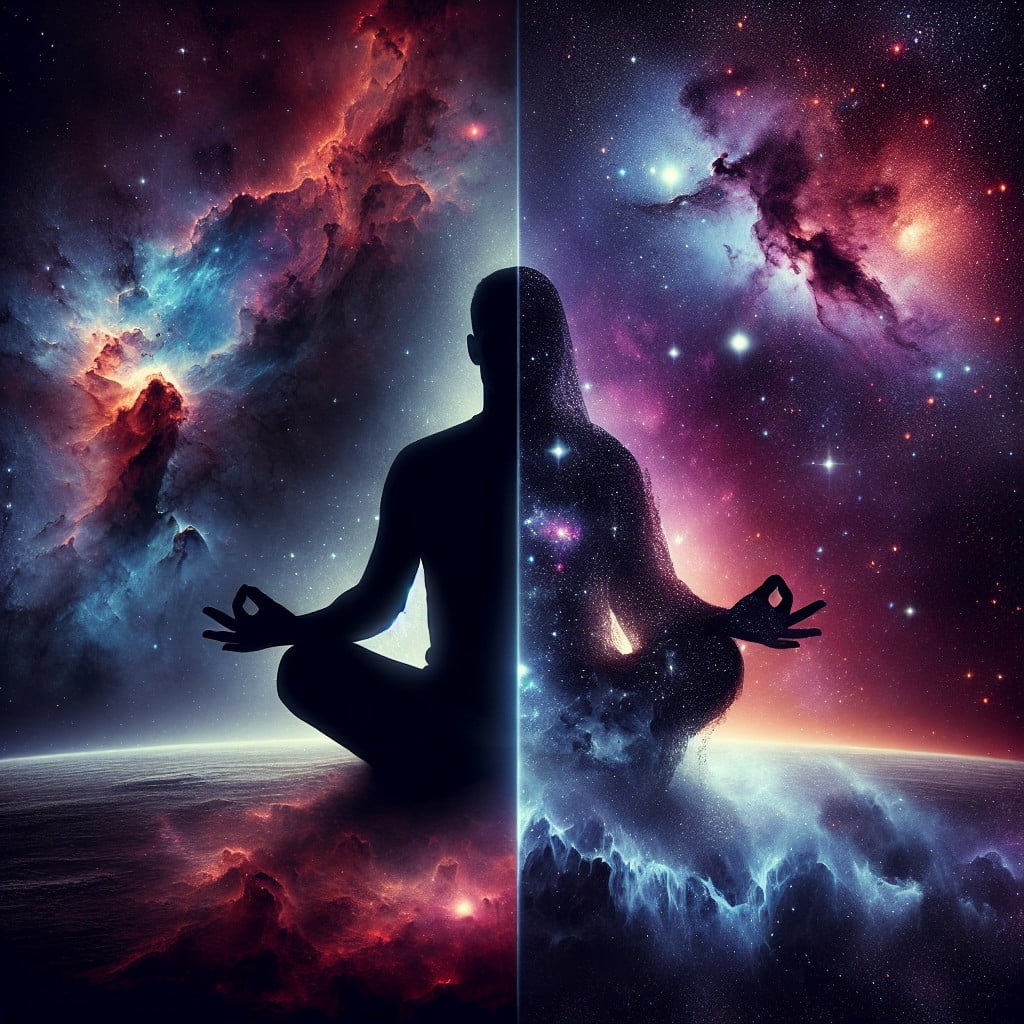You might want to consider meditating in the dark because it can amplify the benefits of your mindfulness practice, to which this article delves deeper.
Meditating in the dark can be a deeply soothing and introspective experience, but is it the right choice for everyone? When it comes to meditation, there’s no one-size-fits-all solution. The choice to meditate in the dark depends on personal preferences, comfort level, and the specific goals of your meditation practice.
This article will delve into the benefits and considerations of meditating in the dark, helping you make an informed decision that aligns with your unique meditation journey. Whether you’re a seasoned meditator or just beginning, understanding the impact of your environment, including lighting, can enhance your practice and overall mindfulness.
Key takeaways:
- Sensory deprivation: The darkness creates a unique environment for sensory deprivation.
- Enhanced concentration: Without the distractions of light, the mind can concentrate better.
- Greater introspection: Meditating in the dark encourages shifting focus inward.
- Potential for deep relaxation: Dark meditation can lead to profound relaxation states.
- Cultivating fearlessness: Meditating in the dark helps confront and overcome fears.
Understanding Dark Meditation: A Brief Overview

Dark meditation, as the name suggests, is a form of deep concentration that takes place in completely dimmed or darkened surroundings. This practice centers around enhancing the quality of your mental contemplation by eliminating visual distractions. The general premise is to create an environment where your focus is solely on your innermost thoughts and experiences, rather than being influenced by external stimuli.
Several factors make up the core concepts behind this meditative practice:
- 1. Sensory Deprivation: The darkness creates a unique environment for sensory deprivation, mainly visual, thus allowing you to dive deeper into the subconscious.
- 2. Enhanced Concentration: Without the common distractions that light can bring like color, movement, and shape, your mind is free to concentrate better on meditation.
- 3. Greater Introspection: The absence of light encourages you to shift your focus inward, promoting a heightened sense of introspection and self-awareness.
- 4. Potential for Deep Relaxation: Dark meditation can often lead to profound relaxation states, as the lack of visual stimuli helps to quiet the mind quicker.
- 5. Cultivating Fearlessness: Meditating in the dark can help you face and overcome internal fears, as it presents an opportunity to confront potential discomfort in solitude.
This form of meditation draws on the principle that less sensory input can open the door to deeper, more profound meditative experience.
The Possible Benefits of Dark Room Meditation

Meditating in a dark room offers unique rewards. Firstly, the sense of sight, often overloaded during the day, gets a much-needed break, paving the way towards a calming introspective journey. Additionally, it facilitates a deeper focus, minimizing the distractions that light may introduce.
Some proponents suggest that dark room meditation can intensify the pineal gland’s function, leading to a potential rise of melatonin, the sleep hormone, providing beneficial effects on sleep quality and circadian rhythm.
Moreover, exploring our inner world in the dark helps build emotional resilience as it enables us to face fears that may emerge, creating a space for self-discovery and growth. Lastly, the darkness can heighten other senses, providing a unique perspective during the meditation process.
The Daily Practice of Dark Meditation: Is It Feasible?

Incorporating dark meditation into your daily routine may pose certain challenges. The first one being accessibility to a dark room at all times as this form of meditation requires a completely dark environment for optimal results. Thus, it may not be feasible for those living in shared spaces.
Secondly, dark meditation may not be suitable for those with certain psychological conditions such as nyctophobia (fear of the dark). Without proper guidance, the experience can be discomforting or overwhelming.
Thirdly, adjusting to this form of meditation can take time. The absence of light alters our sense of perception which can feel disorientating initially. Some individuals may even experience sleepiness, making it difficult to maintain focus during the practice.
While these points present certain considerations, they should not discourage anyone interested in exploring dark meditation. Methods can be adjusted and personalized to work around these challenges, for instance, using blindfolds instead of a dark room or practicing at night.
Remember, successful integration of any meditation practice into daily routine relies heavily on persistence, patience, and finding what suits your individual needs and comfort.
Dark Meditation Versus Dark Energy Meditation: What’s the Difference?

While the two might seem similar, dark meditation and dark energy meditation hold different concepts at their cores.
Dark meditation revolves around isolating oneself from all external stimuli to focus on the inner self — a state sought in a light-deprived environment. This practice aims to cultivate deep introspection, heighten meditation experiences, and encourage a profound connection with one’s consciousness.
On the other hand, dark energy meditation isn’t dependent on physical darkness. It is an advanced meditation technique rooted in the idea of harnessing the unobservable ‘dark’ energy in the universe. Proponents believe the technique can lead to heightened levels of vitality and spiritual wisdom.
So while both forms of meditation deal with the ‘darkness,’ one focuses on the physical environment and internal introspection, while the other relates to unseen universal energies. Both offer unique avenues for inner exploration and spiritual growth, each with a special emphasis. Your choice depends on personal preference and spiritual ambitions.
Learning Dark Meditation: Comprehensive Techniques
To delve into a robust practice of Dark Meditation, here are some techniques that can be safely and effectively employed:
- Setting the Environment: Dark meditation isn’t merely about switching off the lights. Eliminate any possible sources of light for complete darkness. Ensure comfort, so choose a cozy position on a meditation chair or cushion.
- Starting Small: Initially, aim for shorter durations like 10-15 minutes. As comfort with the practice grows, lengthen your sessions.
- Focused Breathing: Center your attention around your breath. Feel the air entering and leaving your body, as it brings calm and focus.
- Visualized Imagery: Use your mind’s eye to visualize peaceful and serene surroundings. Let this mental imagery guide your meditation.
- Progressive Relaxation: As you breathe, consciously let go of the tension in different muscle groups, starting from your toes and working your way up to your head.
- Soft Sounds: Use a calming sound like a singing bowl or a softly spoken mantra to guide your meditation in the darkness.
It is crucial to maintain consistency in practice and remember that like all meditation techniques, mastering Dark Meditation might take time.
The Historical Context of Dark Meditation
Tracing its roots, it is fascinating to find that the practice of dark meditation spans throughout various cultures and religion. Ancient Egyptians believed in the healing power of darkness and its relationship with higher spiritual awakening. Similarly, Taoist philosophy integrated it into their retreats, using total darkness to encourage spiritual growth.
In Buddhism, extended periods of darkness meditation are a part of traditional monastic training, utilized to develop a profound understanding of life’s impermanence.
Other cultures, like indigeneous Maya and Andean traditions, see darkness not as an absence of light, but a powerful energy full of potential. They instigate its use for inner peace and balance. Dark meditation was also central to the Eleusinian Mysteries, secret rites of Ancient Greece, epitomizing death and rebirth.
These instances reaffirm how civilizations reached spiritual enlightenment through this practice, sparking a rich tapestry of interpretations and methods that are still observed to date.
Assessing the Value of Dark Meditation: Is It Worth It?
Delving into the worth of dark meditation, it’s important to understand this isn’t a one-size-fits-all answer but depends on individual experiences and needs.
Firstly, dark meditation can help drive a state of deep relaxation, making it a valuable tool for stress management. Eliminating visual stimuli allows a heightened focus on the internal world, encouraging introspection and self-awareness.
Secondly, darkness can also help facilitate better sleep patterns. By tapping into the body’s natural circadian rhythms, dark meditation can optimize sleep quality, making it beneficial for individuals struggling with sleep disorders.
Finally, some practitioners believe that dark meditation can evoke profound spiritual experiences, creating a bridge between the conscious and subconscious mind. This can potentially lead to personal transformation and growth.
However, engaging in dark meditation may not be for everyone. It necessitates a certain level of comfort with solitude, silence, and introspection. It’s also worth noting that unguided exploration of the subconscious may not be advisable for individuals dealing with certain emotional or psychological conditions. As with any mindfulness practice, it’s essential to listen to one’s own needs and respect one’s boundaries.
Hence, the value of dark meditation is a personal evaluation. It can potentially add depth to regular meditation practice, but its worth is subjectively experienced.
FAQ
Is it better to meditate in the dark or the light?
Meditation is effective in both light and dark settings, with the preference depending on individual comfort and less distractions.
Is it okay to meditate in a dark room?
Meditating in a dark room can be beneficial, especially for those comfortable with darkness and experienced in meditation practices.
Should there be light during meditation?
Yes, experiencing light during meditation is completely natural and indicates that your mind and soul are deeply rooted inside your body.
Is it OK to meditate at night?
Yes, it is perfectly fine to meditate at night as it can lead to relaxation, better sleep, and heightened awareness of the self.
Does the presence of light affect the quality of meditation?
Yes, the presence of light can affect the quality of meditation, as a soothing, dim light can create a calming environment, improving focus and reducing distractions during meditation.
How does meditating in a dark room compare to practicing in a lit one?
Meditating in a dark room can enhance focus and reduce sensory stimuli, promoting a quieter mind, while practicing in a lit room can help maintain alertness and provide a more grounding experience.
Can darkness enhance the depth and effectiveness of meditation?
Indeed, darkness can enhance the depth and effectiveness of meditation, as it allows for minimal distraction, resulting in intense focus and relaxed state of mind.